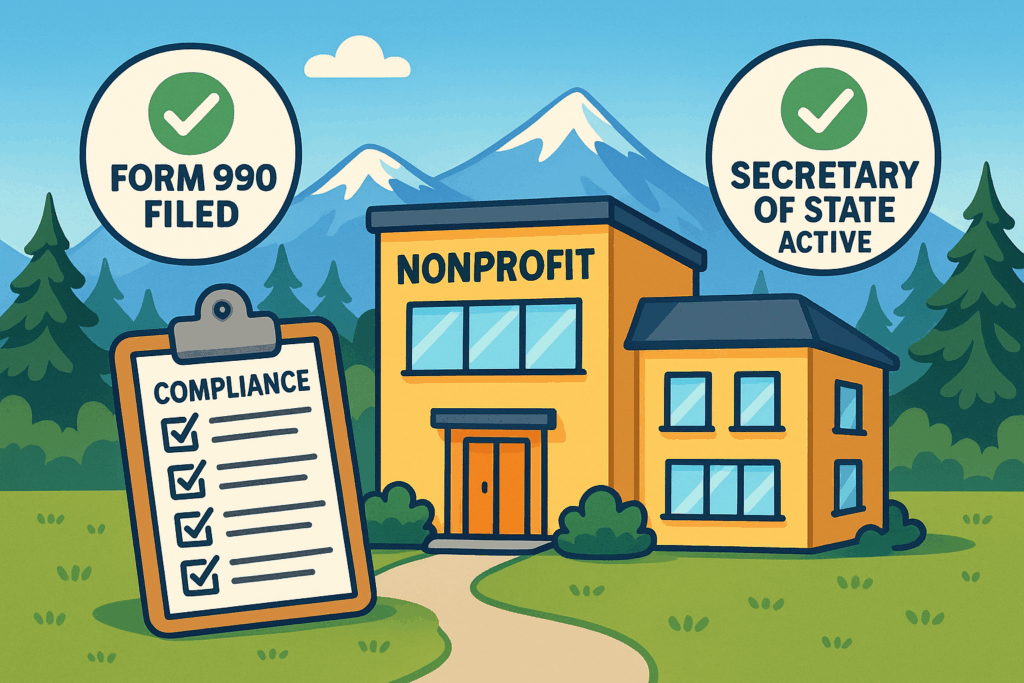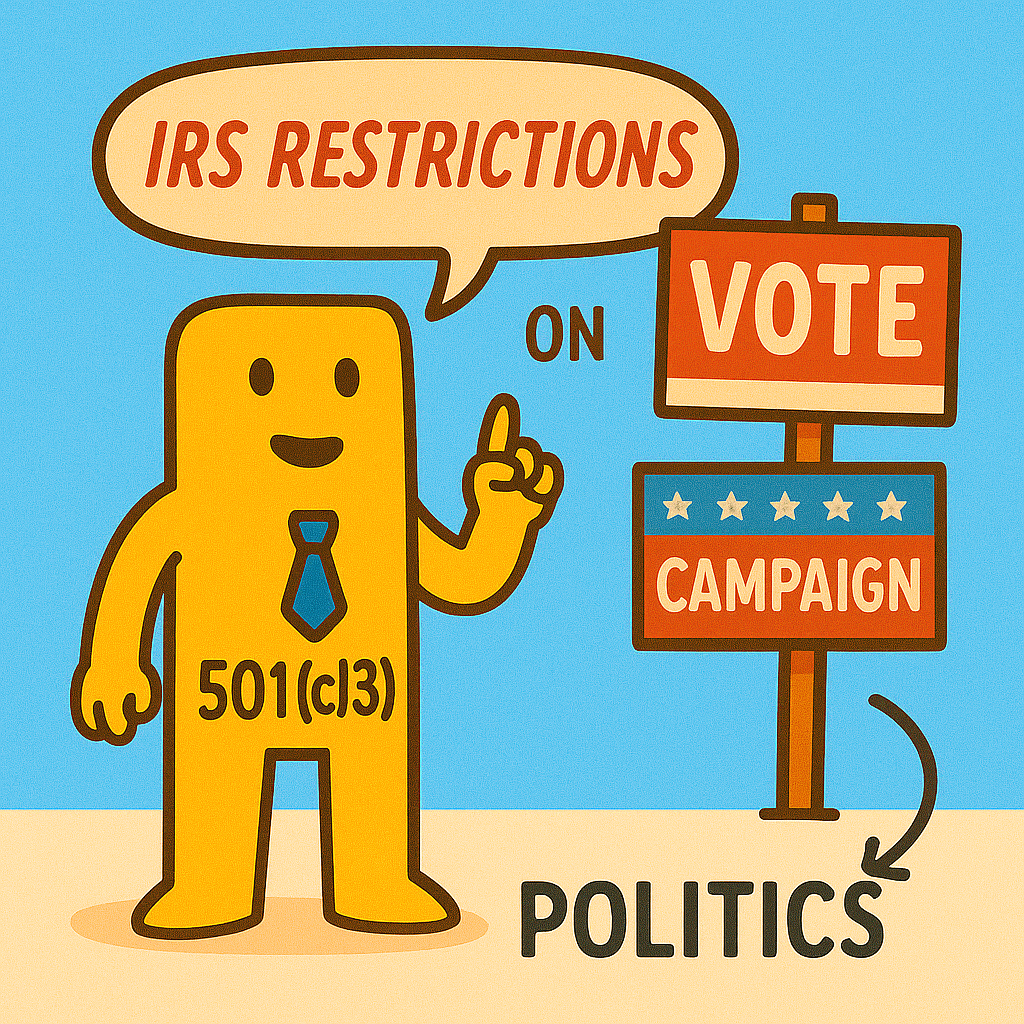Introduction
Did you know over 50,000 nonprofits lose their tax-exempt status every year just because they missed a simple IRS filing?

Most of the time it’s not fraud or anything sinister. It’s just paperwork. And if you’re running a small nonprofit here in Montana, it’s way too easy to let one of these steps fall through the cracks. Let too much paperwork fall through, and suddenly the IRS revokes your exempt status. You’re paying income tax at the organizational level, and your donors receive love letters informing them that their donations are no longer deductible.
Nightmare scenario. It’s heartbreaking… and completely avoidable. Let’s walk through the 501(c)(3) requirements so you know exactly what you need to do to stay compliant year after year.
501(c)(3) Requirements
1. File Your Form 990 On Time, Every Year
This one is the biggie. Every 501(c)(3), no matter how small, has to file a version of the Form 990 every year. In Montana, it’s always tragic to see a good nonprofit end up on the IRS revocation list simply because someone forgot to file for three consecutive years. That’s all it takes—three strikes, and you’re out.

Here’s how to know what form you need:
- Under $50K in revenue? File a 990-N e-postcard. Pretty simple.
- $50K–$200K? Most likely a 990-EZ. If you’ve done one of these, it’s called EZ, but depending on the fact pattern, it can be anything but simple.
- Over $200K or assets over $500K? You’re in full 990 territory.
Mark your calendar to file by the 15th day of the 5th month after your fiscal year ends. So, if your year ends Dec 31, your 990 is due May 15. You can file to get an automatic extension to file six months later than this. Most nonprofits take advantage of extensions because no tax is due with the return.
2. Stay Registered with the Montana Secretary of State
This part feels less scary than the IRS stuff… until you realize your nonprofit can get involuntarily dissolved just for missing a $20 filing.
Every Montana nonprofit has to file an Annual Report with the Secretary of State. It’s due by April 15th each year. And yes, this is separate from your Form 990.
Go to sosmt.gov and file online—it takes maybe 10 minutes. But if you skip it, your corporation can get marked as inactive. That’s bad news for grant applications, bank accounts, and general trust.
Mark it as an annual recurring reminder on your calendar and get it done.
3. Maintain Your Charitable Solicitation License

This is the most forgotten compliance step in Montana. If you solicit donations from the public, you may need to register with the Montana Department of Justice, Office of Consumer Protection. While there’s no statewide registration requirement, some Montana counties and cities do require it.
You’ll file a Charitable Organization Registration Form, pay a small fee (depending on your revenue), and renew annually. If your org raises less than $25K and doesn’t pay a fundraiser, you might be exempt—but you still need to file the exemption form.
4. Keep Accurate Financial and Governance Records
If the IRS audits you—or even if a donor pokes around—you’ll want to show clean, organized records. I recommend keeping at least 7 years of financial records and permanent documents, such as bylaws, indefinitely.
Financials & Permanent Documents (last 7 years)
- Financial statements
- Meeting minutes
- Board decisions and resolutions
- A budget and actuals comparison
- Any major financial transactions
Bonus tip: Store everything digitally. You don’t want to lose your only copy of meeting minutes because they were handwritten and shoved in a folder in someone’s garage.
5. Monitor Private Benefit and Political Activity Restrictions

This one trips up even smart, well-meaning orgs. As a 501(c)(3), you can’t:
- Funnel money to insiders (that’s private inurement)
- Campaign for or against political candidates
- Do more than an “insubstantial” amount of lobbying
Sounds simple, right? But the gray areas sneak up fast. If a board member gets reimbursed for “consulting” without a contract or fair market value backup? That’s a red flag.
And on the political side, if you’re posting about issues on social media, make sure you’re not crossing into candidate endorsements. Stick to issue advocacy and educational content, not campaign cheerleading.
6. Update the IRS and State When Things Change
Nonprofits are like living organisms—they evolve and adapt. Maybe your address changes or you elect new officers. Those changes need to be reported.
- For the IRS, use Form 8822-B.
- For the Montana Secretary of State, file an Amended Annual Report.
- For the Montana DOJ, you may need to update your charitable registration.
Why does this matter? Let me tell you—it is really hard to fix mismatched addresses across three agencies when the IRS sends your notice to the wrong place. Keep your contact info current and save yourself the headache.
Conclusion
Keeping your 501(c)(3) compliant in Montana isn’t rocket science—it’s just a series of small, easy-to-miss steps. The danger comes from letting things slide or assuming someone else is handling it (unless you let us simply handle everything for you, then you can rest easy).
But you’ve got this. Set reminders. Build compliance into your annual rhythm. And remember: you’re not just doing this to avoid penalties—you’re doing it to protect your mission, your donors, and your community.
Or, if you want help staying on top of all the paperwork so you can focus on furthering your organization’s mission, let us know and we’d be happy to help.
Disclaimer: This article is for informational purposes only and is not intended as tax, legal, or financial advice. Always consult with a qualified professional about your specific situation. Reading this post does not create a CPA–client relationship.

Joe Holbrook is a CPA and Partner at Elevated Tax & Accounting. Joe’s career has focused on helping business owners pay less tax and improve cash flow, serving companies ranging from small, local businesses, Fortune 500 companies, and everything in between. He also supports nonprofits fulfill their missions through financial excellence, given the highly active nonprofit environment surrounding Elevated’s office in beautiful Missoula, Montana.
